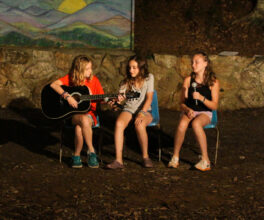Don’t let homesickness prevent your children from having a summer camp experience they’ll never forget!
At Camp Friendship, we take pride in creating a home away from home for our campers. Our staff is well-trained to handle all levels of homesickness and encourage campers to make the most of their time at camp. Our goal is for every camper to have a successful summer during which they gain independence, learn new things, and form connections with others.
To make that goal a reality, follow these tips for helping your child deal with homesickness at summer camp.
Recognize that homesickness at sleepaway camp is normal
As a first-time camper, or maybe even returning camper, many children will face the difficulties of homesickness. Being homesick is not abnormal. For many families in today’s plugged in world, summer camp is the first real separation they have experienced, making homesickness the norm rather than the exception.
In fact, research shows that around 90% of campers experience some level of homesickness at least once during the summer. Let your child know that it’s completely okay to miss home and the things that are familiar to them. Since homesickness at summer camp is to be expected, it’s important to understand how to help your child move forward and enjoy the summer. Even if homesickness doesn’t go away entirely, it is important for children to know that they can be both homesick and happy at camp.
Prepare for the inevitable
Parents can help overcome homesickness at camp by preparing themselves and their camper for the summer. Start by acknowledging the realities of homesickness. Explain that feeling homesick is tough, but completely normal and not a sign that camp isn’t fun. Together, come up with coping strategies like journaling, hugging a favorite stuffed animal, or even reading a new book. Empowering campers to self-regulate and be okay with missing home is a skill they will be able to rely on for the rest of their lives.
Remind your camper that homesick feelings typically hit during downtimes like right before bed or in between activities. It can be helpful to walk your camper through asking for assistance from a counselor at these times. The more your camper understands about these new feelings and what to do when they arise, the more manageable they become.
Our Family Camp is also a gentle way to introduce your child to the newness of camp life. With parents and siblings along for the fun, your child will become familiar with all that camp has to offer. You can also take this time to coach them on typical camping skills, like how to use a flashlight at night.
Give your child time to adjust to camp life
While homesickness is common at sleepaway camps and across all ages, it often doesn’t last long. Since 1966, we’ve supported our campers through initial adjustment periods. This experience allows us to confidently say that homesickness usually goes away quickly. In fact, homesickness typically fades after the first night because they become so busy with activities and new friends. If this isn’t the case for your child, that’s absolutely okay. For some children, expecting the feelings of homesickness to go away entirely is fruitless, and a regular part of learning to live away from home.
Throughout their time away from home, counselors are your camper’s first line of communication and comfort while at camp. They will help support your child, with the guidance and professional expertise of a Camp Director guiding the way. Our staff work to establish a strong relationship right off the bat, orient campers to camp life, and help them feel comfortable so each child has the confidence to find security and acceptance outside their home.
Stay in touch…but don’t overdo it
Communicating with your camper can be a great way to alleviate homesickness and remind your camper that they’re in your thoughts. You can send snail mail letters and e-Letters using our email system.
It’s important to send just enough letters and e-Letters that your child feels supported, but you don’t have to write every single day or expect them to do the same. Constant updates on the events occurring at home may leave them feeling left out. Instead of sharing stories from home, focus on asking about their experiences at camp.
We recognize that homesickness goes both ways. No matter how many years your camper has been attending camp, missing them never gets any easier. You can stay updated on camp happenings by following our Facebook Page and Instagram account, or by logging into your secure CampInTouch account, where camp photos are posted daily.
What to say to a child experiencing homesickness at summer camp
If your child gets homesick, follow these rules of thumb when communicating with them.
Empathize with them
Be sure to validate their feelings. Let them know how proud you are for taking the big step to come to camp and how excited you are to hear about their accomplishments when they finish.
Provide reassurance
Reassure them that it’s okay to miss home, everyone does at some point, and being in a new environment can be hard. Express confidence in their ability to be away at camp. It can be comforting for them to hear that “nothing exciting is happening at home.”
Relate to them
Share personal experiences of a time when you yourself felt homesick and what you did to overcome it. Alternatively, if your camper has an older sibling or family member that experienced homesickness, share what helped them, but try to keep it short.
Focus on the positive parts of summer camp
By the time you receive a homesick letter, your camper is likely to have already bounced back and started to enjoy themselves again. With that in mind, it’s important that your letter doesn’t hinder any progress they may already have made. Try to avoid addressing the more negative parts of their letter and instead concentrate your letter on any exciting news your camper has already shared. Redirecting the conversation to discuss the fun times will help them to realize all they could be participating in. “Camp is like life,” said one camper on an open forum, “The more you get involved, the more you’ll get out of it.”
Make them smile
Write them encouraging, cheerful letters with a few jokes to bring a smile to their face.
Don’t suggest they quit
As a parent, it can be difficult to act against your instinct to say “If you don’t like it you can just come home.” While many parents think this will reassure their child, it often does much more harm than good. It sets your child up for failure since most campers will have some sad feelings they will need to work through. Sending your child to camp with the knowledge that they can pull the plug at any time can set them up to have an unsuccessful summer.
Our staff are trained to address homesickness by connecting with campers, helping them engage in camp life, and reminding them that the best way to combat homesickness is to fully jump into camp. Of course, in severe cases of homesickness, it may be best for your child to leave camp, but that is something we would work with you on after several conversations and updates from a Camp Director.
Handling homesickness is a reality many campers and their parents will have to face. For us, addressing homesickness is all about teaching kids that they have the strength to overcome it. By sharing coping strategies and encouraging engagement in fun activities, parents can help minimize the uncomfortability of missing home even from afar. The goal is that this open dialog will empower children to handle the challenge of homesickness so they can enjoy even more adventures throughout their lives!





